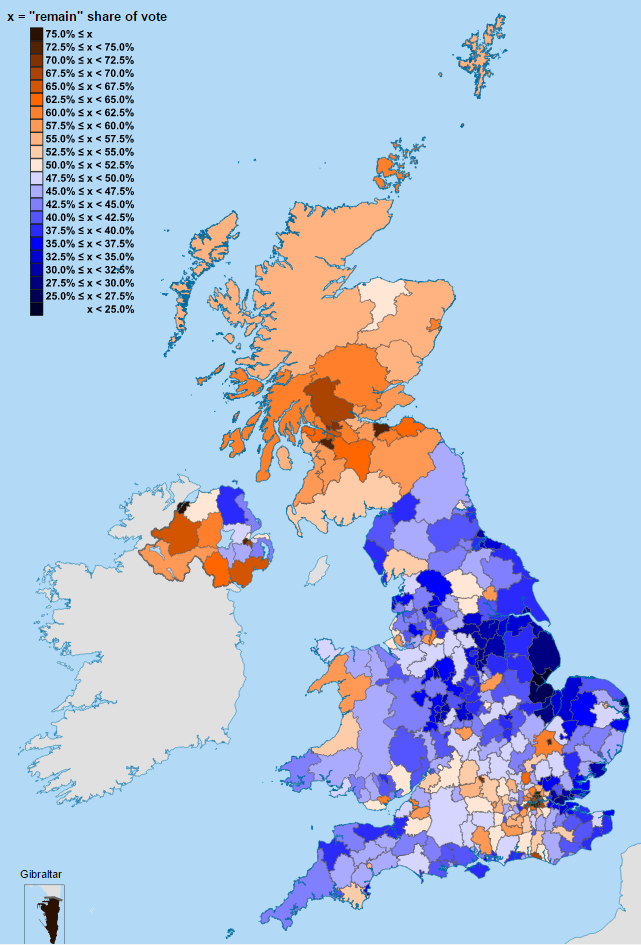Power to the People or New Enclosures? Socio-political Fragmentation in the Knowledge Age (1)
Part I: Brexit, Trump, and the “commons”
The shift from an economy powered by natural resources and physical labor to one in which knowledge and the mind have become the dominant means of production is at the root of a world-scale, structurally disruptive transformation. This process goes beyond the clustering of entrepreneurial innovation, talent, and economic assets in what Richard Florida – Professor of Business and Creativity and current director of the Martin Prosperity Institute at the University of Toronto’s Rotman School of Management – calls “a handful of superstar cities and knowledge-tech hubs.”
The author claims that this process, which has benefited roughly a third of the global workforce, while the other 66% has lagged further behind, has “undermined two core institutions of the old order: the large vertical corporation and the nation-state.” This created synergies that ask for the devolution of political power to the municipal sphere, as well as of economic power to the grassroots level, in the form of a greater investment in local and regional-level supply chains.
However, the emergence of a knowledge-based society has undermined not only the nation-state, but also social cohesion in a way that threatens the consensus underlying post-World War II western democracies. It has created a disjuncture between the “winners” and “losers” of this process that can be perceived not only in the economic realm, but also in terms of geography and identities.

Results of the 2016 EU membership referendum in the UK. Image by Mirrorme22 Nilfanion et al. / CC BY-SA 3.0

Results of the 2016 US presidential election by county. Counties in red voted for Trump; counties in blue voted for Clinton. Image by Ali Zifan / CC BY-SA 4.0
Much has already been written about how the results of the 2016 UK EU membership referendum and the US presidential election made fully transparent a series of rifts in core western societies, which have been increasing in the last three decades, in terms of spending power, education, age, and the urban/rural divide. These rifts have been congealing around two increasingly endogamic and disconnected social blocks: A “heartland” of nativist, socially conservative voters who see in “alt-right” politics a panacea to economic and cultural marginalization, and a Hanseatic League-like transnational network of cosmopolitan urban areas, whose tendentially younger, more educated population will gear towards socially progressive values. Such values translate themselves into either a center-of-left voting tendency or a rising level of abstention, as a result of a sense of alienation from the existing polity.[i]
Oliver Garner – a researcher at the Constitutionalism and Politics working group of the European University Institute – sees in this disjuncture a rationale for a reframing of the European project around the development of the “embryonic status of ‘EU citizenship’” in a way that disconnects social and political rights from territory. The author claims that, as a result of Brexit and in the event of further fragmentation within the EU, the most effective way to prevent a rolling back of the rights conceded by EU citizenship would be to reframe it as an optional status founded upon a set of “particular values and societal ideals”, instead of Member State nationality. This would reframe the EU as a “floating polity”, in a way that would supposedly “accommodate the concerns of the ‘Eurosceptics’ who rally against the imposition of the EU in national law and politics by finally providing a clear demarcation of competences and individual subjects.”
The expanding field of “alternative livelihoods” that are being built around urban and neo-rural “commons” has also been incubating similar tendencies. In an article published in December 2016 in Le Monde Diplomatique, Sébastien Broca claims that the centrality that “the commons” has been gaining in left-wing discourse in recent years has been contributing to reinforce the neo-liberal “third way” orientation that has alienated much of its traditional electorate.
This is happening despite the fact that “commons” researchers such as Elinor Ostrom have contributed to dismantle the neo-liberal precept that private property is always the most efficient system of allocation and management of resources.[ii] In Italy, the commons movement has been waging significant resistance to the privatization of public goods and services, having contributed to the blocking of the privatization of water and public services by the Constitutional Court. However, as argued by Benjamin Coriat, the commons need the backing of solid public policies and regulations not only to develop, but also to contain the reproduction of social inequalities and exclusionary dynamics in their midst, as well as in their relationship with wider society.
The research group “Connected Consumption and Connected Economy,” led by Juliet Schor, a sociologist based at Boston College, has been finding out that the “circuits of commerce” and “good matches” promoted by “sharing economy” platforms tend to favor people with high cultural capital, which is associated with middle to upper class status. The information intensive nature of such platforms promote the subalternization of people with lower levels of literacy and information technology skills, therefore accentuating dynamics of concentration of resources and social exclusion that promote income inequality and unemployment.
For Richard Florida, whether or not these centrifugal forces – and the risk of breakdown of the democratic consensus – will accentuate in the near future depends on the capacity of progressive forces within politics and civil society to outline an inclusive future in this new age of urbanized knowledge capitalism that does not mean reaching backward to placate the forces of reaction, but creating a vision of a diverse, inclusive, and prosperous polity.
[i] Further analysis on abstention among younger urban voters in the 2016 UK EU membership referendum and US presidential elections can be found at http://www.bbc.com/news/politics/eu_referendum/results and http://www.bbc.com/news/election-us-2016-37634526 . [ii] Such argument is developed in Ostrom, Elinor (1990). Governing the Commons: The Evolution of Institutions for Collective Action. Cambridge, UK: Cambridge University Press ; Ostrom, Elinor; Walker, James (2003). Trust and reciprocity: interdisciplinary lessons from experimental research. New York: Russell Sage Foundation ; Ostrom, Elinor (June 2010). "Beyond markets and states: polycentric governance of complex economic systems". American Economic Review. American Economic Association. 100 (3): 641–72
Voting. Photo by redjar / CC BY-SA 2.0
![]() This work is licensed under a Creative Commons Attribution-NonCommercial-ShareAlike 4.0 International License.
This work is licensed under a Creative Commons Attribution-NonCommercial-ShareAlike 4.0 International License.




